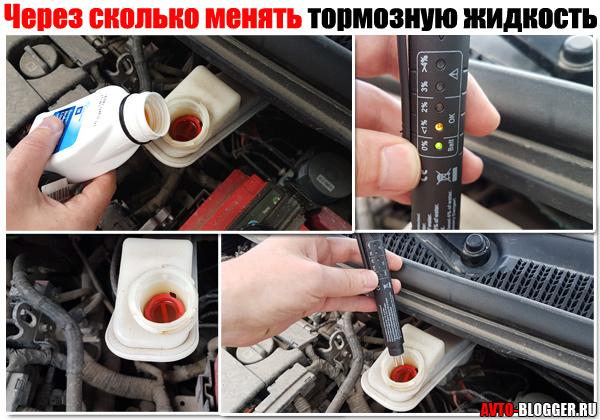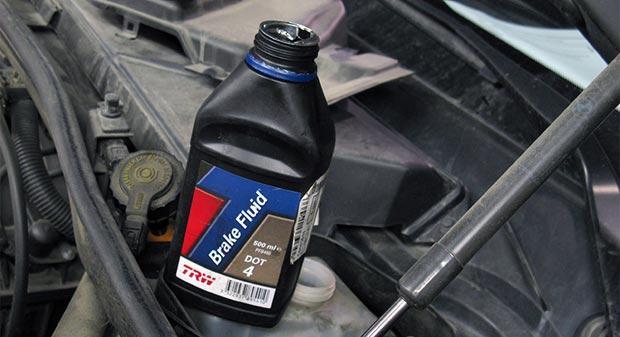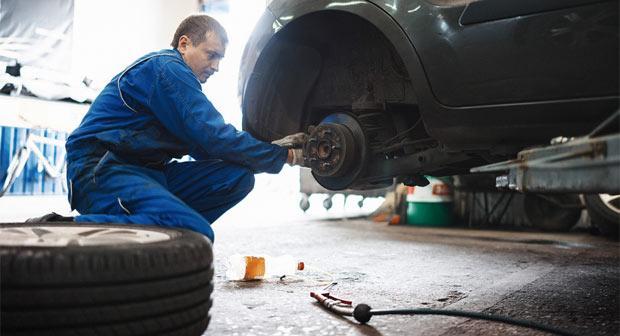
How often should the brake fluid be changed?
Content
Why change brake fluid?
Let's start with the basics. Brake fluid acts as a pressure transmitter from the master brake cylinder (GTE) to the workers. The driver presses on the pedal, the gas turbine engine (the simplest piston in a housing with a valve system) sends a pressure of fluid through the lines. The fluid transfers pressure to the working cylinders (calipers), the pistons extend and spread the pads. The pads are pressed with force to the working surface of the discs or drums. And due to the frictional force between these elements, the car stops.
The main properties of the brake fluid include:
- incompressibility;
- resistance to low and high temperatures;
- neutral attitude to plastic, rubber and metal parts of the system;
- good lubricating properties.
Pay attention: the property of incompressibility is written first. That is, the fluid must clearly, without delay and fully transfer pressure to the working cylinders or calipers.


Brake fluid has one unpleasant property: hygroscopicity. Hygroscopicity is the ability to accumulate moisture from the environment.
Water in the volume of the brake fluid reduces its resistance to boiling. For example, DOT-4 liquid, the most common today, will not boil until it reaches a temperature of 230°C. And this is the minimum requirement of the US Department of Transportation standard. The actual boiling point of good brake fluids reaches 290°C. When only 3,5% of the total volume of water is added to the brake fluid, the boiling point drops to +155 °C. That is about 30%.
The braking system generates a lot of heat energy during its operation. This is logical, because the stopping force arises from friction with a large clamping force between the pads and the disc (drum). These elements sometimes heat up to 600°C in the contact patch. The temperature from the discs and pads is transferred to the calipers and cylinders, which heats up the fluid.
And if the boiling point is reached, the liquid will boil. A gas plug forms in the system, the liquid will lose its incompressibility property, the pedal will fail and the brakes will fail.


Replacement intervals
How often should the brake fluid be changed? On average, the service life of this technical fluid before the accumulation of a critical amount of water is 3 years. This is true for glycol variants such as DOT-3, DOT-4 and its variations, as well as DOT-5.1. DOT-5 and DOT-5.1/ABS fluids, which use a silicone base as a base, are more resistant to water accumulation, they can be changed for 5 years.
If the car is used every day, and the climate in the region is predominantly humid, it is advisable to reduce the time between regular brake fluid changes by 30-50%. Glycolic fluids under difficult operating conditions of the system need to be changed every 1,5-2 years, silicone fluids - 1 time in 2,5-4 years.


How do you know when it's time to change your brake fluid?
In case you don’t know when the brake fluid was last updated (forgot or just bought a car), there are two ways to understand if it’s time to change.
- Use a brake fluid analyzer. This is the simplest device that estimates the percentage of moisture in a volume by the electrical resistance of ethylene glycol or silicone. There are several versions of this brake fluid tester. For domestic needs, the simplest one is suitable. As practice has shown, even a cheap device has a negligible error, and it can be trusted.
- Visually evaluate the brake fluid. We unscrew the plug and look into the expansion tank. If the liquid is cloudy, has lost its transparency, darkened, or fine inclusions are noticeable in its volume, we definitely change it.
Remember! It's better to forget to change the engine oil and get into an engine repair than to forget about the brake fluid and have an accident. Among all the technological fluids in a car, the most important is brake fluid.
//www.youtube.com/watch?v=ShKNuZpxXGw&t=215s
